Case 1
PreambleThis essay is really good! Read it! It'll help you with English!
That said it is also rather cheem and at times difficult to understand, but that just comes with the package doesn't it.
ClarificationsNow, as we say in debate, let me deal with some housekeeping issues. Sorry about the last post about a memory card, I'm sorry if any of you took it seriously because I wasn't serious. It was just that I needed one for my laptop (and still do in fact). Sorry if any of you gave it thought and thank you for your kind wishes.
The Real DealNow that that is dealt with, I move on to my case substantive.
The scene is in my home in Singapore, four years ago. My parents are out and I’m lazing around on the couch, strumming my guitar. Suddenly, I hear my Father’s car roll through the driveway. I thrust my guitar onto its stand, drop my guitar pick and hastily start doing the homework I should have been doing the moment I got back from school, in short, I look busy. My parents stroll in and see nothing amiss. This is a familiar image. Many of us can identify with it, having done similar things ourselves when we were younger. Many of us would condemn it too, realizing now that such idling is folly, or is it? We live in a society that denounces idling as foolishness and sheer idiocy. Idling is a thing to warn your child against, to shun and to repress. Condemning idleness has become such a knee-jerk reaction that we do it faster than a teenager can send out a text message. However, for all the hate idling gets, is it really so bad? For me, the answer is a simple no.
Society thinks a great many things about idling. “An idle mind is the devil’s workshop” goes the old proverb, “Work is no disgrace: it is idleness which is a disgrace” says Hesiod the Greek poet. However, these vague, cryptic statements tell us little about the act itself. They beg the question, “what is idleness really all about?” For me, idleness is a matter of focus. A man studying Max Weber’s “The Protestant Ethic and the Spirit of Capitalism” for his class tomorrow could hardly be classified as idling, for he has a solid goal in mind. However, a man who stumbles upon a random book while lazing around the house and begins to read it half-heartedly would be idling. Similarly, a teenager who starts chatting to a friend he meets in the street is chatting idly, while a businessman who meets a client and discusses business over lunch is not idle. Idling by this definition then, is not the absence of activity, but the absence of focused and purposeful activity. This does not mean that nothing of value can be achieved while idling. Li Bai, a famed poet of ancient China, wrote his most famous poems while drinking and idling with his friends. Rather, it just means that there is no initial purpose or motive in idling. Idleness is fluid, anarchic and the point of it is that there is no point of it. It does not need one.
Obviously, not all of us, or even many of us, will be a modern day Li Bai. Our result-oriented, consumerist selves immediately ask, “Why in the world should we bother with being idle?” This is because in the words of John Lennon, “Time you've enjoyed wasting is not wasted time at all”. Idle time gives a person’s mind space to stretch out and yawn. It is a time to explore our insignificant curiosities, to indulge our trivial fancies, to amuse and entertain ourselves while taking it easy. It relaxes our rigid work ethics, and unravels the ropes of stress and discipline that bind the giant of creativity. While idle time may not be very productive, it certainly is very therapeutic and is an essential activity for our minds.
Idle time is also not completely unproductive. Just as a computer can lend its processing power to computing the human genome while in hibernation, so can the human mind, while idling, solve that math problem you’ve been wondering about for weeks. Sometimes solutions to our problems wander like whales through the seas of our minds, waiting for the right trigger to erupt into splendid clarity. Idling lets our unconscious mind solve the conscious mind’s problems and gives creativity and imagination the free reign it needs to produce brilliance.
ConclusionIdling is a wonderful thing. It refreshes and enriches the mind and sometimes even helps us solve problems. That being said, it is not a replacement for hard work. However it is a necessary respite from the rat race of life, a restful exercise that allows us to exercise our creativity with child-like abandon. As a wise sage once said, “take everything in moderation and you shall have everything in abundance.” Like all things, it is bad for us when done excessively. That should not however, cause us to vilify it or ignore its usefulness. It is not a sin or crime anymore than sleeping or vacationing is. Those who don’t idle every so often and let their minds take a break from the daily grind only make it harder on themselves. So idle every once in awhile, it’s good for you.
What do you think?
Homeward Gaze
The shadow lengthens, time drags
dreary, bleached, heart sputters and lags.
Crouched in his chair, sadness weeps
forlorn and bitter, looking to the east.
Lonesome and weary, darkness his blanket
alien and wary, solitude his penchant.
Through glass shutters, he gazes blankly
down cold cheeks, roll tears silently
-written 25/9/06-by JTZ-
A Home, for Now
I'm staying with my Dad's friends (Uncle Jim and Aunty Sharon) right now, they're aweseome people. They own a charming house which is older than my Dad and its alot nicer than most of the houses I've been in, and I've been in quite afew. But then you aren't interested in me talking, after all, a picture says a thousand words right?
Enjoy:

The House where I stay

The place where I sleep
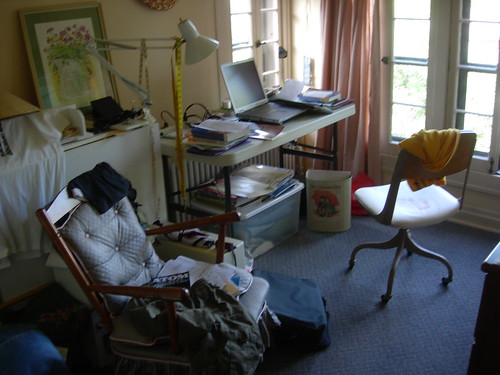
The room next to where I sleep where I dump all my stuff
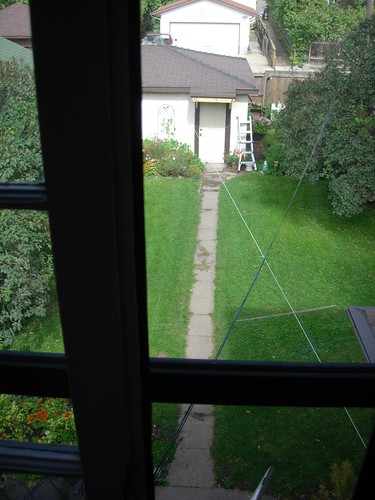
The view from said room

Me in the basement doing laundry (Yes, I actually can)
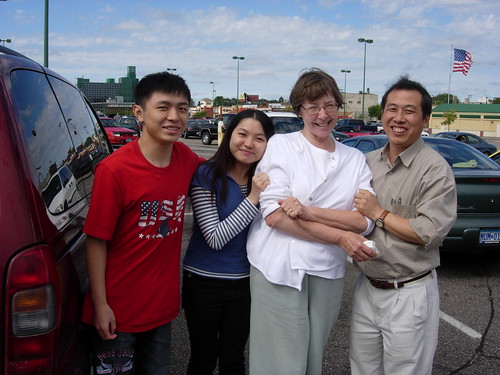
My Dad, Aunty Sharon who I am staying with, and a Vietnamese pair of siblings they take to church every sunday. (Uncle Jim was getting the car)

The american sky.
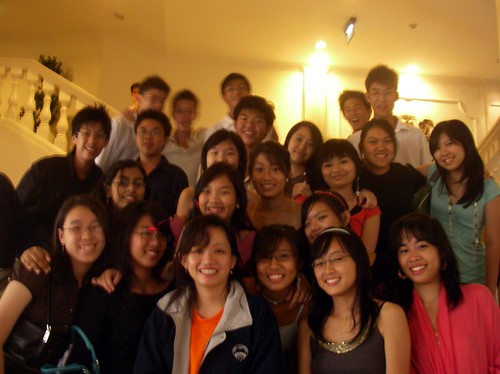
You guys are still the best!
Benevolent Ambivalence
21/09
The proff was passionate today, as usual. Nearly didn't let us out of class. It was raining, so we were sleepy, but he went on anyway, trying to wrest some meaning out of Stevenson's essay and thrust it into our thick craniums. I sat there, blank, mute. Furious thoughts poured through my head which slid harmlessly into the oblivion of indifference. I had a thousand things to say, yet I said nothing. The class idiot made an ass of himself, to the delight of the class and the bewilderment of the professor. I stifled a sigh and waited for it to end......
17/09
It was cold, freezing even outside. We had just gotten back from a pleasant stroll by the lake. We were at a friend's place for dinner. They were a kindly British couple who had been friends with dad since 20 years ago. They were nice. We had curry for dinner while their large, friendly and excited dog made a nuisance of himself for our hosts. I didn't mind. They were nice. We took a walk and I nearly froze, though I didn't let it show. Who likes letting stuff like that show? It was cold, but I'd been in colder. So I got used to it. When we got back into the house, I went up to wash my hands. The water from the tap came from the cold faucet, but it felt warm to my hands. I realized then how bloody cold it was......
??/09
I was unsure, unsteady. I felt uprooted, like a giant oak which had been reduced to nothing more than a shriveled stump. My wits crumbled around me, my formidable tongue which had scared a dozen classmates off in primary school reduced to babbling incoherency. I tried to think of something, anything at all, but nothing came. My mind was stuck in a rut, I couldn't even remember the date. Someone proffered a hand, "Hi, my name is Jinhee, yours?"......
27/08
The plane landed without incident. I was in a kind of stupor. It wasn't that I was in disbelief, or depression or outrage or anything like that. It was a kind of benevolent or mildly suprised ambivalence really. It wasn't that I wanted, or for that matter didn't want to come. It was more like a mild resignation, a kind of indifferent acceptence of the way things were, the way things had to be. That is, that was how I felt then. I thought, "well theres nothing I can do anyway, nothing practical, nothing
safe. So I didn't try, I didn't realize how much I'd regret it, and how bad I'd feel about regreting. Lifes like that I guess, it happens, and theres nothing you, or me, or anyone in the world can do about it......
21/09
I dodged into the library, and shrugged the cold out of my bones. It didn't bother me anymore. I guess, three layers of clothes helped, but it didn't bother me. I seated myself swiftly, and efficiently set up the laptop. A song came, unbidden to my mind.
"Slow down, you move too fast. You got to make the moment last, Just, kickin down, the cobblestones. Lookin for fun and feelin groovy......I got no deeds to do no promises to keep. I'm baffled and drowsy and ready to sleep when the morning comes drop all its petals on me. Life I love you always groovy....."pictures, later
Quitting the Paint Factory by Mark Slouka (Part 5, Final)
CLEARING BRUSH
At times you can almost see it, this flypaper we’re attached to, this mechanism we labor in, this delusion we inhabit. A thing of such magnitude can be hard to make out, of course, but you can rough out its shape and mark its progress, like Lon Chaney’s Invisible Man, by its effects: by the things it renders quaint or obsolete, by the trail of discarded notions it leaves behind. What we’re leaving behind today, at record pace, is whatever belief we might once have had in the value of unstructured time: in the privilege of contemplating our lives before they are gone, in the importance of uninterrupted conversation, in the beauty of play. In the thing in itself – unmediated, leading nowhere. In the present moment.
Admittedly, the present – in its ontological, rather than consumerist, sense – has never been too popular on this side of the Atlantic; we’ve always been a finger-drumming, restless bunch, suspicious of jawboning, less likely to sit at the table than to grab a quick one at the bar. Whitman might have exhorted us to loaf and invite our souls, but that was not an invitation we cared to extend, not unless the soul played poker, ha, ha. No sir, a Frenchman might invite his soul. One expected such things. But an American? An American would be out the swinging doors and halfway to tomorrow before his silver dollar had stopped ringing on the counter.
I was put in mind of all this last June while sitting on a bench in London’s Hampstead Heath. My bench, like many others, was almost entirely hidden; well off the path, delightfully overgrown, it sat at the top of a long-grassed meadow. It had a view. There was whimsy in its placement, and joy. It was thoroughly impractical. It had clearly been placed there to encourage one thing – solitary contemplation.
And sitting there, listening to the summer drone of the bees, I suddenly imagined George W. Bush on my bench. I can’t tell you why this happened, or what in particular brought the image to my mind. Possibly it was the sheer incongruity of it that appealed to me, the turtle-on-a-lamppost illogic of it; earlier that summer, intrigued by images of Kafka’s face on posters advertising the Prague Marathon, I’d entertained myself with pictures of Franz looking fit for the big race. In any case, my vision of Dubya sitting on a bench, reading a book on his lap – smiling or nodding in agreement, wetting a finger to turn a page – was so discordant, so absurd, that I realized I’d accidentally stumbled upon one of those visual oxymorons that, by its very dissonance, illuminates something essential.
What the picture of George W. Bush flushed into the open for me was the classically American and increasingly Republican cult of movement, of busy-ness; of doing, not thinking. One could imagine Kennedy reading on that bench in Hampstead Heath. Or Carter, maybe. Or even Clinton (though given the bucolic setting, one could also imagine him in other, more Dionysian scenarios). But Bush? Bush would be clearing brush. He’d be stomping it into submission with his pointy boots. He’d be making the world a better place.
Now, something about all that brush clearing had always bothered me. It wasn’t the work itself, though I’d never fully understood where all that brush was being cleared from, or why, or how it was possible that there was any brush still left between Dallas and Austin. No, it was the frenetic, anti-thinking element of it I disliked. This wasn’t simply outdoor work, which I had done my share of and knew well. This was brush clearing as a statement, a gesture of impatience. It captured the man, his disdain for the inner life, for the virtues of slowness and contemplation. This was movement as an answer to all those equivocating intellectuals and Gallic pontificators who would rather talk than do, think than act. Who could always be counted on to complicate what was simple with long-winded discussions of complexity and consequences. Who were weak.
And then I had it, the thing I’d been trying to place, the thing that had always made me bristle – instinctively – whenever I saw our fidgety, unelected President in action. I recalled reading about an Italian art movement called Futurism, which had flourished in the first decades of the twentieth century. Its practitioners had advocated a cult of restlessness, of speed, of dynamism; had rejected the past in all its forms; had glorified business and war and patriotism. They had also, at least in theory, supported the growth of fascism.
The link seemed tenuous at best, even facile. Was I seriously linking Bush – his shallowness, his bustle, his obvious suspicion of nuance – to the spirit of fascism? As much as I loathed the man, it made me uneasy. I’d always argued with people who applied the word carelessly. Having been called a fascist myself for suggesting that an ill-tempered rottweiler be put on a leash, I had no wish to align myself with those who had downgraded the word to a kind of generalized epithet, roughly synonymous with “asshole,” to be applied to whoever disagreed with them. I had too much respect for the real thing. And yet there was no getting around it; what I’d been picking up like a bad smell whenever I observed the Bush team in action was the faint but unmistakable whiff of fascism; a democratically diluted fascism, true, and masked by the perfume of down-home cookin’, but fascism nonetheless.
Still, it was not until I’d returned to the States and had forced myself to wade through the reams of Futurist manifestos – a form that obviously spoke to their hearts – that the details of the connection began to come clear. The linkage had nothing to do with the Futurists’ art, which was notable only for its sustained mediocrity, nor with their writing, which at times achieved an almost sublime level of badness. It had to do, rather, with their ant-like energy, their busy-ness, their utter disdain of all the manifestations of the inner life, and with the way these traits seemed so organically linked in their thinking to aggression and war. “We intend to exalt aggressive action, a feverish insomnia,” wrote Filippo Marinetti, perhaps the Futurists’ most breathless spokesman. “We will glorify war – the world’s only hygiene – militarism, patriotism, the destructive gesture of freedom-bringers….. We will destroy the museums, libraries, academies of every kind….. We will sing of great crowds excited by work.”
“Militarism, patriotism, the destructive gesture of freedom-bringers,” “a feverish insomnia,” “great crowds excited by work” … I knew that song. And yet still, almost perversely, I resisted the recognition. It was too easy, somehow. Wasn’t much of the Futurist rant (”Take up your pickaxes, your axes and hammers and wreck, wreck the venerable cities, pitilessly”) simply a gesture of adolescent rebellion, a FUCK YOU scrawled on Dad’s garage door? I had just about decided to scrap the whole thing when I came across Marinetti’s later and more extended version of the Futurist creed. And this time the connection was impossible to deny.
In the piece, published in June of 1913 (roughly six months after Anderson walked out of the paint factory), Marinetti explained that Futurism was about the “acceleration of life to today’s swift pace.” It was about the “dread of the old and the known… of quiet living.” The new age, he wrote, would require the “negation of distances and nostalgic solitudes.” It would “ridicule . . . the ‘holy green silence’ and the ineffable landscape.” It would be, instead, an age enamored of “the passion, art, and idealism of Business.”
This shift from slowness to speed, from the solitary individual to the crowd excited by work, would in turn force other adjustments. The worship of speed and business would require a new patriotism, “a heroic idealization of the commercial, industrial, and artistic solidarity of a people”; it would require “a modification in the idea of war,” in order to make it “the necessary and bloody test of a people’s force.”
As if this weren’t enough, as if the parallel were not yet sufficiently clear, there was this: The new man, Marinetti wrote – and this deserves my italics – would communicate by “brutally destroying the syntax of his speech. He wastes no time in building sentences. Punctuation and the right adjectives will mean nothing to him. He will despise subtleties and nuances of language.” All of his thinking, moreover, would be marked by a “dread of slowness, pettiness, analysis, and detailed explanations. Love of speed, abbreviation, and the summary. ‘Quick, give me the whole thing in two words!’”
Short of telling us that he would have a ranch in Crawford, Texas, and be given to clearing brush, nothing Marinetti wrote could have made the resemblance clearer. From his notorious mangling of the English language to his well-documented impatience with detail and analysis to his chuckling disregard for human life (which enabled him to crack jokes about Aileen Wuornos’s execution as well as mug for the cameras minutes before announcing that the nation was going to war), Dubya was Marinetti’s “New Man”: impatient, almost pathologically unreflective, unburdened by the past. A man untroubled by the imagination, or by an awareness of human frailty. A leader wonderfully attuned (though one doubted he could ever articulate it) to “today’s swift pace”; to the necessity of forging a new patriotism; to the idea of war as “the necessary and bloody test of a people’s force”; to the all-conquering beauty of Business.
Quitting the Paint Factory by Mark Slouka (part 4)
THE CHURCH OF WORK
There’s something un-American about singing the virtues of idleness. It is a form of blasphemy, a secular sin. More precisely, it is a kind of latter-day antinomianism, as much a threat to the orthodoxy of our day as Anne Hutchinson’s desire 350 years ago to circumvent the Puritan ministers and dial God direct. Hutchinson, we recall, got into trouble because she accused the Puritan elders of backsliding from the rigors of their theology and giving in to a Covenant of Works, whereby the individual could earn his all-expenses-paid trip to the pearly gates through the labor of his hands rather than solely through the grace of God. Think of it as a kind of frequent-flier plan for the soul.
The analogy to today is instructive. Like the New England clergy, the Religion of Business – literalized, painfully, in books like Jesus, C.E.O. – holds a monopoly on interpretation; it sets the terms, dictates value.
[In this new lexicon, for example, “work” is defined as the means to wealth; “success,” as a synonym for it.]
Although today’s version of the Covenant of Works has substituted a host of secular pleasures for the idea of heaven, it too seeks to corner the market on what we most desire, to suggest that the work of our hands will save us. And we believe. We believe across all the boundaries of class and race and ethnicity that normally divide us; we believe in numbers that dwarf those of the more conventionally faithful. We repeat the daily catechism, we sing in the choir. And we tithe, and keep on tithing, until we are spent.
It is this willingness to hand over our lives that fascinates and appalls me. There’s such a lovely perversity to it; it’s so wonderfully counterintuitive, so very Christian: You must empty your pockets, turn them inside out, and spill out your wife and your son, the pets you hardly knew, and the days you simply missed altogether watching the sunlight fade on the bricks across the way. You must hand over the rainy afternoons, the light on the grass, the moments of play and of simply being. You must give it up, all of it, and by your example teach your children to do the same, and then – because even this is not enough – you must train yourself to believe that this outsourcing of your life is both natural and good. But even so, your soul will not be saved.
The young, for a time, know better. They balk at the harness. They do not go easy. For a time they are able to see the utter sadness of subordinating all that matters to all that doesn’t. Eventually, of course, sitting in their cubicle lined with New Yorker cartoons, selling whatever it is they’ve been asked to sell, most come to see the advantage of enthusiasm. They join the choir and are duly forgiven for their illusions. It’s a rite of passage we are all familiar with. The generations before us clear the path; Augustine stands to the left, Freud to the right. We are born into death, and die into life, they murmur; civilization will have its discontents. The sign in front of the Church of Our Lady of Perpetual Work confirms it. And we believe.
All of which leaves only the task of explaining away those few miscreants who out of some inner weakness or perversity either refuse to convert or who go along and then, in their thirty-sixth year in the choir, say, abruptly abandon the faith. Those in the first category are relatively easy to contend with; they are simply losers. Those in the second are a bit more difficult; their apostasy requires something more… dramatic. They are considered mad.
In one of my favorite anecdotes from American literary history (which my children know by heart, and which in turn bodes poorly for their futures as captains of industry), the writer Sherwood Anderson found himself, at the age of thirty-six, the chief owner and general manager of a paint factory in Elyria, Ohio. Having made something of a reputation for himself as a copywriter in a Chicago advertising agency, he’d moved up a rung. He was on his way, as they say, a businessman in the making, perhaps even a tycoon in embryo. There was only one problem: he couldn’t seem to shake the notion that the work he was doing (writing circulars extolling the virtues of his line of paints) was patently absurd, undignified; that it amounted to a kind of prison sentence. Lacking the rationalizing gene, incapable of numbing himself sufficiently to make the days and the years pass without pain, he suffered and flailed. Eventually he snapped.
It was a scene he would revisit time and again in his memoirs and fiction. On November 27, 1912, in the middle of dictating a letter to his secretary (”The goods about which you have inquired are the best of their kind made in the…”), he simply stopped. According to the story, the two supposedly stared at each other for a long time, after which Anderson said: “I have been wading in a long river and my feet are wet,” and walked out. Outside the building he turned east toward Cleveland and kept going. Four days later he was recognized and taken to a hospital suffering from exhaustion.
Anderson claimed afterward that he had encouraged the impression that he might be cracking up in order to facilitate his exit, to make it comprehensible. “The thought occurred to me that if men thought me a little insane they would forgive me if I lit out,” he wrote, and though we will never know for sure if he suffered a nervous breakdown that day or only pretended to one (his biographers have concluded that he did), the point of the anecdote is elsewhere: Real or imagined, nothing short of madness would do for an excuse.
Anderson himself, of course, was smart enough to recognize the absurdity in all this, and to use it for his own ends; over the years that followed, he worked his escape from the paint factory into a kind of parable of liberation, an exemplar for the young men of his age. It became the cornerstone of his critique of the emerging business culture: To stay was to suffocate, slowly; to escape was to take a stab at “aliveness.” What America needed, Anderson argued, was a new class of individuals who “at any physical cost to themselves and others” would “agree to quit working, to loaf, to refuse to be hurried or try to get on in the world.”
“To refuse to be hurried or try to get on in the world.” It sounds quite mad. What would we do if we followed that advice? And who would we be? No, better to pull down the blinds, finish that sentence. We’re all in the paint factory now.
Quitting the Paint Factory by Mark Slouka (Part 3)
KA-CHINK!
Time may be money (though I’ve always resisted that loathsome platitude, the alchemy by which the very gold of our lives is transformed into the base lead of commerce), but one thing seems certain: Money eats time. Forget the visions of sanctioned leisure: the view from the deck in St. Moritz, the wafer-thin TV. Consider the price.
Sometimes, I want to say, money costs too much. And at the beginning of the millennium, in this country, the cost of money is well on the way to bankrupting us. We’re impoverishing ourselves, our families, our communities – and yet we can’t stop ourselves. Worse, we don’t want to.
Seen from the right vantage point, there’s something wonderfully animistic about it. The god must be fed; he’s hungry for our hours, craves our days and years. And we oblige. Every morning (unlike the good citizens of Tenochtitlan, who at least had the good sense to sacrifice others on the slab) we rush up the steps of the ziggurat to lay ourselves down. It’s not a pretty sight.
Then again, we’ve been well trained. And the training never stops. In a recent ad in The New York Times Magazine, paid for by an outfit named Wealth and Tax Advisory Services, Inc., an attractive young woman in a dark business suit is shown working at her desk. (She may be at home, though these days the distinction is moot.) On the desk is a cup, a cell phone, and an adding machine. Above her right shoulder, just over the blurred sofa and the blurred landscape on the wall, are the words, “Successful entrepreneurs work continuously.” The text below explains: “The challenge to building wealth is that your finances grow in complexity as your time demands increase.”
The ad is worth disarticulating, it seems to me, if only because some version of it is beamed into our cerebral cortex a thousand times a day. What’s interesting about it is not only what it says but what it so blithely assumes. What it says, crudely enough, is that in order to be successful, we must not only work but work continuously; what it assumes is that time is inversely proportional to wealth: our time demands will increase the harder we work and the more successful we become. It’s an organic thing; a law, almost. Fish gotta swim and birds gotta fly, you gotta work like a dog ’til you die.
Am I suggesting then that Wealth and Tax Advisory Services, Inc. spend $60,000 for a full-page ad in The New York Times Magazine to show us a young woman at her desk writing poetry? Or playing with her kids? Or sharing a glass of wine with a friend, attractively thumbing her nose at the acquisition of wealth? No. For one thing, the folks at Wealth and Tax, etc. are simply doing what’s in their best interest. For another, it would hardly matter if they did show the woman writing poetry, or laughing with her children, because these things, by virtue of their placement in the ad, would immediately take on the color of their host; they would simply be the rewards of working almost continuously.
What I am suggesting is that just as the marketplace has co-opted rebellion by subordinating politics to fashion, by making anger chic, so it has quietly underwritten the idea of leisure, in part by separating it from idleness. Open almost any magazine in America today and there they are: The ubiquitous tanned-and-toned twenty-somethings driving the $70,000 fruits of their labor; the moneyed-looking men and women in their healthy sixties (to give the young something to aspire to) tossing Frisbees to Irish setters or tying on flies in midstream or watching sunsets from their Adirondack chairs.
Leisure is permissible, we understand, because it costs money; idleness is not, because it doesn’t. Leisure is focused; whatever thinking it requires is absorbed by a certain task: sinking that putt, making that cast, watching that flat-screen TV. Idleness is unconstrained, anarchic. Leisure – particularly if it involves some kind of high-priced technology – is as American as a Fourth of July barbecue. Idleness, on the other hand, has a bad attitude. It doesn’t shave; it’s not a member of the team; it doesn’t play well with others. It thinks too much, as my high school coach used to say. So it has to be ostracized.
[Or put to good use. The wilderness of association we enter when we read, for example, is one of the world’s great domains of imaginative diversity: a seedbed of individualism.
What better reason to pave it then, to make it an accessory, like a personal organizer, a sure-fire way of raising your SAT score, or improving your communication skills for that next interview. You say you like to read? Then don’t waste your time; put it to work. Order Shakespeare in Charge: The Bard’s Guide to Leading and Succeeding on the Business Stage, with its picture of the bard in a business suit on the cover.]
With idleness safely on the reservation, the notion that leisure is necessarily a function of money is free to grow into a truism. “Money isn’t the goal. Your goals, that’s the goal,” reads a recent ad for Citibank. At first glance, there’s something appealingly subversive about it. Apply a little skepticism though, and the implicit message floats to the surface: And how else are you going to reach those goals than by investing wisely with us? Which suggests that, um, money is the goal, after all.
Quitting the Paint Factory by Mark Slouka (Part 2)
INFINITE BUSTLE
I’m a student of the narrowing margins. And their victim, to some extent, though my capacity for sloth, my belief in it, may yet save me, like some stubborn heretic in fifth-century Rome, still offering gifts to the spirit of the fields even as the priests sniff about the temple for sin, I daily sacrifice my bit of time. The pagan gods may yet return. Constantine and Theodosius may die. But the prospects are bad.
In Riverside Park in New York City, where I walk these days, the legions of “weekend nannies” are growing, setting up a play date for a ten-year-old requires a feat of near-Olympic coordination, and the few, vestigial, late-afternoon parents one sees, dragging their wailing progeny by the hand or frantically kicking a soccer ball in the fading light, have a gleam in their eyes I find frightening. No outstretched legs crossed at the ankles, no arms draped over the back of the bench. No lovers. No be-hatted old men, arguing. Between the slide and the sandbox, a very fit young man in his early thirties is talking on his cell phone while a two-year-old with a trail of snot running from his nose tugs on the seam of his corduroy pants. “There’s no way I can pick it up. Because we’re still at the park. Because we just got here, that’s why.”
It’s been one hundred and forty years since Thoreau, who itched a full century before everyone else began to scratch, complained that the world was increasingly just “a place of business. What an infinite bustle!” he groused. “I am awaked almost every night by the panting of the locomotive. It interrupts my dreams. There is no Sabbath. It would be glorious to see mankind at leisure for once. It is nothing but work, work, work.” Little did he know. Today the roads of commerce, paved and smoothed, reach into every nook and cranny of the republic; there is no place apart, no place where we would be shut of the drone of that damnable traffic. Today we, quite literally, live to work. And it hardly matters what kind of work we do; the process justifies the ends. Indeed, at times it seems there is hardly an occupation, however useless or humiliating or downright despicable, that cannot at least in part be redeemed by our obsessive dedication to it: “Yes, Ted sold shoulder-held Stingers to folks with no surname, but he worked so hard!”
Not long ago, at the kind of dinner party I rarely attend, I made the mistake of admitting that I not only liked to sleep but liked to get at least eight hours a night whenever possible, and that nine would be better still. The reaction – a complex Pinot Noir of nervous laughter displaced by expressions of disbelief and condescension – suggested that my transgression had been, on some level, a political one. I was reminded of the time I’d confessed to Roger Angell that I did not much care for baseball.
My comment was immediately rebutted by testimonials to sleeplessness: two of the nine guests confessed to being insomniacs; a member of the Academy of Arts and Letters claimed indignantly that she couldn’t remember when she had ever gotten eight hours of sleep; two other guests declared themselves grateful for five or six. It mattered little that I’d arranged my life differently, and accepted the sacrifices that arrangement entailed. Eight hours! There was something willful about it. Arrogant, even. Suitably chastened, I held my tongue, and escaped alone to tell Thee.
Increasingly, it seems to me, our world is dividing into two kinds of things: those that aid work, or at least represent a path to it, and those that don’t. Things in the first category are good and noble; things in the second aren’t. Thus, for example, education is good (as long as we don’t have to listen to any of that “end in itself” nonsense) because it will presumably lead to work. Thus playing the piano or swimming the 100-yard backstroke are good things for a fifteen-year-old to do not because they might give her some pleasure but because rumor has it that Princeton is interested in students who can play Chopin or swim quickly on their backs (and a degree from Princeton, as any fool knows, can be readily converted to work).
Point the beam anywhere, and there’s the God of Work, busily trampling out the vintage. Blizzards are bemoaned because they keep us from getting to work. Hobbies are seen as either ridiculous or self-indulgent because they interfere with work. Longer school days are all the rage (even as our children grow demonstrably stupider), not because they make educational or psychological or any other kind of sense but because keeping kids in school longer makes it easier for us to work. Meanwhile, the time grows short, the margin narrows; the white spaces on our calendars have been inked in for months. We’re angry about this, upset about that, but who has the time to do anything anymore? There are those reports to report on, memos to remember, emails to deflect or delete. They bury us like snow.
The alarm rings and we’re off, running so hard that by the time we stop we’re too tired to do much of anything except nod in front of the TV, which, like virtually all the other voices in our culture, endorses our exhaustion, fetishizes and romanticizes it and, by daily adding its little trowelful of lies and omissions, helps cement the conviction that not only is this how our three score and ten must be spent but that the transaction is both noble and necessary.
Quitting the Paint Factory, by Mark Slouka (Part 1)
Love yields to business. If you seek a way out of love, be busy; you’ll be safe, then.
-Ovid, Remedia Amoris
I distrust the perpetually busy; always have. The frenetic ones spinning in tight little circles like poisoned rats. The slower ones, grinding away their fourscore and ten in righteousness and pain. They are the soul-eaters.
When I was young, my parents read me Aesop’s fable of “The Ant and the Grasshopper,” wherein, as everyone knows, the grasshopper spends the summer making music in the sun while the ant toils with his fellow formicidae. Inevitably, winter comes, as winters will, and the grasshopper, who hasn’t planned ahead and who doesn’t know what a 401K is, has run out of luck. When he shows up at the ants’ door, carrying his fiddle, the ant asks him what he was doing all year: “I was singing, if you please,” the grasshopper replies, or something to that effect. “You were singing?” says the ant. “Well, then, go and sing.” And perhaps because I sensed, even then, that fate would someday find me holding a violin or a manuscript at the door of the ants, my antennae frozen and my bills overdue, I confounded both Aesop and my well-meaning parents, and bore away the wrong moral. That summer, many a windblown grasshopper was saved from the pond, and many an anthill inundated under the golden rain of my pee.
I was right.
In the lifetime that has passed since Calvin Coolidge gave his speech to the American Society of Newspaper Editors in which he famously proclaimed that “the chief business of the American people is business,” the dominion of the ants has grown enormously. Look about: The business of business is everywhere and inescapable; the song of the buyers and the sellers never stops; the term “workaholic” has been folded up and put away. We have no time for our friends or our families, no time to think or to make a meal. We’re moving product, while the soul drowns like a cat in a well. [”I think that there is far too much work done in the world,” Bertrand Russell observed in his famous 1932 essay “In Praise of Idleness,” adding that he hoped to “start a campaign to induce good young men to do nothing.” He failed. A year later, National Socialism, with its cult of work (think of all those bronzed young men in Leni Riefenstahl’s Triumph of the Will throwing cordwood to each other in the sun), flared in Germany.]
A resuscitated orthodoxy, so pervasive as to be nearly invisible, rules the land. Like any religion worth its salt, it shapes our world in its image, demonizing if necessary, absorbing when possible. Thus has the great sovereign territory of what Nabokov called “unreal estate,” the continent of invisible possessions from time to talent to contentment, been either infantilized, rendered unclean, or translated into the grammar of dollars and cents. Thus has the great wilderness of the inner life been compressed into a median strip by the demands of the “real world,” which of course is anything but. Thus have we succeeded in transforming even ourselves into bipedal products, paying richly for seminars that teach us how to market the self so it may be sold to the highest bidder. Or perhaps “down the river” is the phrase.
Ah, but here’s the rub: Idleness is not just a psychological necessity, requisite to the construction of a complete human being; it constitutes as well a kind of political space, a space as necessary to the workings of an actual democracy as, say, a free press. How does it do this? By allowing us time to figure out who we are, and what we believe; by allowing us time to consider what is unjust, and what we might do about it. By giving the inner life (in whose precincts we are most ourselves) its due. Which is precisely what makes idleness dangerous. All manner of things can grow out of that fallow soil. Not for nothing did our mothers grow suspicious when we had “too much time on our hands.” They knew we might be up to something. And not for nothing did we whisper to each other, when we were up to something, “Quick, look busy.”
Mother knew instinctively what the keepers of the castles have always known: that trouble – the kind that might threaten the symmetry of a well-ordered garden – needs time to take root. Take away the time, therefore, and you choke off the problem before it begins. Obedience reigns, the plow stays in the furrow; things proceed as they must. Which raises an uncomfortable question: Could the Church of Work – which today has Americans aspiring to sleep deprivation the way they once aspired to a personal knowledge of God – be, at base, an anti-democratic force? Well, yes. James Russell Lowell, that nineteenth-century workhorse, summed it all up quite neatly: “There is no better ballast for keeping the mind steady on its keel, and saving it from all risk of crankiness, than business.”
Quite so. The mind, however, particularly the mind of a citizen in a democratic society, is not a boat. Ballast is not what it needs, and steadiness, alas, can be a synonym for stupidity, as our current administration has so amply demonstrated. No, what the democratic mind requires, above all, is time; time to consider its options. Time to develop the democratic virtues of independence, orneriness, objectivity, and fairness. Time, perhaps (to sail along with Lowell’s leaky metaphor for a moment), to ponder the course our unelected captains have so generously set for us, and to consider mutiny when the iceberg looms.
Which is precisely why we need to be kept busy. If we have no time to think, to mull, if we have no time to piece together the sudden associations and unexpected, mid-shower insights that are the stuff of independent opinion, then we are less citizens than cursors, easily manipulated, vulnerable to the currents of power.
But I have to be careful here. Having worked all of my adult life, I recognize that work of one sort or another is as essential to survival as protein, and that much of it, in today’s highly bureaucratized, economically diversified societies, will of necessity be neither pleasant nor challenging nor particularly meaningful. I have compassion for those making the most of their commute and their cubicle; I just wish they could be a little less cheerful about it. In short, this isn’t about us so much as it is about the Zeitgeist we live and labor in, which, like a cuckoo taking over a thrush’s nest, has systematically shoved all the other eggs of our life, one by one, onto the pavement. It’s about illuminating the losses.
We’re enthralled. I want to disenchant us a bit; draw a mustache on the boss.
Hymn
Verse:
Oh refuge of my hardened heart
Oh fast pursuing lover come
As angels dance around your throne
My life by captured fare you own
No silhouette of trodden faith
Nor death shall not my steps be guide
I'll pirouette upon mine grave
For in your path Ill run and hide
Chorus:
Oh gaze of love so melt my pride
That I may in your house but kneel
And in my brokenness to cry
Spring worship unto thee
Verse:
When beauty breaks the spell of pain
The bludgeoned heart shall burst in vain
But not when love be appointed king
And truth shall thee forever reign
[chorus]
Verse:
Sweet jesus carry me away
From cold of night, and dust of day
In ragged hour or salt worn eye
Be my desire, my well sprung lye
[chorus x 2]
Spring worship unto thee
Spring worship unto thee
By the Jars of Clay
random ranting
Ok, so I've just roughly settled my timetable and hopefully it will remain as it is now (although my Older Brother has given me some last minute considerations to think on) And it roughly is as follows:
Monday, Wednesdays and Fridays
-World Politics
-First-year Seminar on the Science Fiction and Popular Science of Isaac Asimov
(2 of my dream courses :D)
Tuesdays and Thursdays
-The World of Jesus (Sounds interesting doesn't it?)
-First-year Expository Writing, Writing and Reading Texts
It may not seem like much, but it is a full-time load of courses. Although these 4 courses only involve 12 hours a week in school, they involve triple that time in studying, reading assigned texts, thinking about said texts and then answering assignments. To top it all off, my laptop crashed this afternoon, vanishing into the oblivion that is technical failure. The possible root problems are that:
-Its Hard Drive is Bad (Bad)
-Its Memory Card is Bad (Not so bad)
-My Windows XP is faulty (Who's isn't?)
Thus, the virtual dog that is computer malfunction ate my homework. So I'll have to rewrite all the essays that are due this week, which I stupidly failed to backup or print. Oh well, sucks to be me.
So moving to a far less banal and irritating topic, I was reading the blogs of people other than:
-my immediate family
-Ps Eve, Seb and Youwei
-and my own
And Clarence had finally decided to stop making an idiot out of himself (though I guess his blog name kinda demands it) and write something halfway serious (not that I fancy myself a serious blogger, cos its obvious I'm not), and well it got me thinking.
Society has many pre-conceived notions of success and what is worth striving for. We like to call these its values I guess. Among these values, or perhaps foremost among them are Wealth, Power, Social Status and Fame. Arguably these are vague terms and in certain cases are interchangeable but that is beside the point. The point is where is God in that dynamic? What of happiness or family or the betterment of mankind? What of the millions of people dying around the world everyday for no other reason than they don't have enough food to eat? Isn't there a higher meaning or purpose in life other than the rat race for money and glory that society throws on us?
What is society's answer to this? Quacks. There are many 'Spiritual Masters', 'Gurus' and bathroom philosophers claiming to have found the answers to those eternal questions, such as "why do we live?", "why do we die?", "where do we go after that?",
"Why do we spend so much of the intervening time waiting for traffic lights?" But claiming is different from having.
These obviously are important questions. Why then is the attention of society so focused on those earlier mentioned things that upon closer inspection are transient and lost as easily as gained?
Why don't they turn to God? Its easy to blame that on a single reason or cause like the internet or Hollywood. But these reasons alone seem to lack weight. I recall from awhile back a group sharing in my youth group led by Sebastian and myself. Seb mentioned repeatedly the importance of defending oneself against and at the sametime reaching out to a Godless, apathetic and adulterous generation.
Why is our Generation like that? Someone wiser than me knows the answer to that and maybe one day I'll know. Maybe I'm just being overly conservative, but I can't look at the pop culture of today and not be troubled. I can't look at a Britney Spears Music Video and not be disturbed. I can't see my friends waste their lives on empty gains and not say something.
I'd like to ask you as a reader to stop just reading and start thinking. What are your answers to those eternal questions? What do you value? What keeps you going?
What in the world are you living and fighting for?That, I think, is something worth pondering.
Anyhow, replies in the comments system would be appreciated so I know when you're talking about a particular post and when you'd just like to talk.
Have a Good one
In the Land of the Free
So its been one and a half weeks since I've got here and things are going ok. I haven't died of culture shock or had any deadly reactions to the food or been alienated into social nonexistence or anything nasty like that. So yeah, things are going great. Classes started yesterday, which really means that my professors got to introduce themselves and tell us that the real classes start next week.
I still miss home though. Despite the fact that I've made new friends and am very interested in my classes, I still wish that I could be in the little red dot called Singapore. Its funny how, inconsequential things like your sister's giggles and your best friends antics and even your brother's gaming advice become so endearing and longed for when they are absent. Still, I guess I'll just have to muddle my way through without them and endeavour to do well in college.
I know some people have been asking incessantly for photos, so here are some from my trip to the mall of America with my International Students Orientation Group.
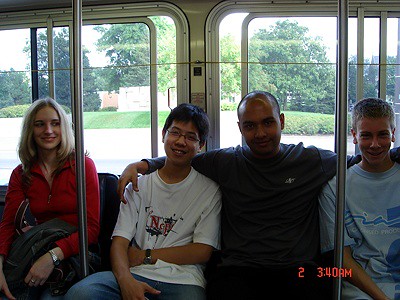
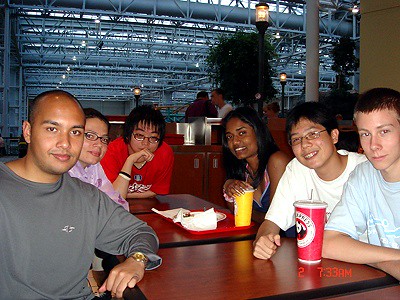
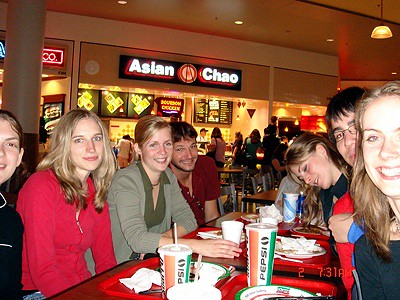
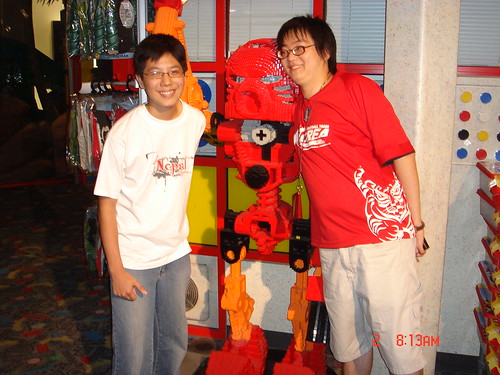
Later












